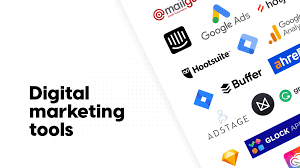The Power of Web Marketing
In today’s digital age, web marketing has become an essential tool for businesses looking to reach and engage with their target audience effectively. Web marketing encompasses a range of strategies and techniques that leverage the internet to promote products or services, build brand awareness, and drive conversions.
Key Components of Web Marketing
Web marketing includes various components such as:
- Search Engine Optimization (SEO): Optimizing your website to rank higher in search engine results pages, increasing visibility and organic traffic.
- Pay-Per-Click (PPC) Advertising: Running targeted ads on search engines or social media platforms to drive traffic to your website.
- Social Media Marketing: Engaging with your audience on social media platforms to build relationships and promote your brand.
- Email Marketing: Sending targeted emails to leads and customers to nurture relationships and drive conversions.
- Content Marketing: Creating valuable and relevant content to attract and engage your target audience.
- Analytics and Reporting: Monitoring performance metrics to track the effectiveness of your web marketing efforts and make data-driven decisions.
The Benefits of Web Marketing
Effective web marketing offers numerous benefits for businesses, including:
- Increased Visibility: Reach a wider audience online through various digital channels.
- Better Targeting: Target specific demographics based on interests, behaviours, and preferences.
- Improved Brand Awareness: Build brand recognition and credibility in the digital space.
- Higher Conversion Rates: Drive qualified leads and convert them into customers through targeted campaigns.
…
7 Essential Tips for Effective Web Marketing Success
- Create a user-friendly website with easy navigation.
- Produce high-quality and engaging content to attract visitors.
- Utilise search engine optimisation (SEO) techniques to improve visibility on search engines.
- Engage with your audience through social media platforms.
- Implement email marketing campaigns to reach out to potential customers.
- Monitor and analyse website analytics to track performance and make informed decisions.
- Collaborate with influencers or other websites for cross-promotion.
Create a user-friendly website with easy navigation.
Creating a user-friendly website with easy navigation is a crucial tip in web marketing. A well-designed website that is intuitive and simple to navigate enhances the user experience, encouraging visitors to explore your content and engage with your brand. Clear navigation menus, logical page layouts, and prominent calls-to-action can guide users seamlessly through your site, leading to higher engagement and conversion rates. By prioritising user-friendliness in your website design, you not only improve customer satisfaction but also boost your online visibility and credibility in the competitive digital landscape.
Produce high-quality and engaging content to attract visitors.
To enhance your web marketing efforts, it is crucial to produce high-quality and engaging content that captivates visitors and encourages them to explore further. Compelling content not only attracts visitors to your website but also keeps them engaged, builds trust, and establishes your brand as a valuable resource in your industry. By creating content that resonates with your target audience’s interests and needs, you can effectively drive traffic, increase user engagement, and ultimately achieve your marketing goals.
Utilise search engine optimisation (SEO) techniques to improve visibility on search engines.
To enhance your online presence and attract more organic traffic, it is crucial to implement search engine optimisation (SEO) techniques effectively. By optimising your website with relevant keywords, meta tags, quality content, and other SEO strategies, you can improve your visibility on search engines like Google. This increased visibility can lead to higher rankings in search results, making it easier for potential customers to find your website and ultimately boost your online success.
Engage with your audience through social media platforms.
Engaging with your audience through social media platforms is a crucial aspect of successful web marketing. By actively interacting with your followers, responding to comments, and sharing valuable content, you can build meaningful relationships and foster a sense of community around your brand. Social media provides a direct channel for communication, allowing you to listen to feedback, address concerns, and showcase the human side of your business. This engagement not only helps in strengthening customer loyalty but also increases brand visibility and drives traffic to your website, ultimately contributing to the overall success of your digital marketing efforts.
Implement email marketing campaigns to reach out to potential customers.
Implementing email marketing campaigns is a strategic approach to connect with potential customers and nurture relationships effectively. By crafting targeted and personalised emails, businesses can deliver relevant content, promotions, and updates directly to the inbox of their audience. This direct communication channel not only helps in reaching out to potential customers but also in building brand loyalty and driving conversions. Email marketing campaigns allow businesses to engage with their audience on a more personal level, making it a valuable tool in the web marketing arsenal.
Monitor and analyse website analytics to track performance and make informed decisions.
Monitoring and analysing website analytics is a crucial tip in web marketing that allows businesses to track the performance of their online activities and make informed decisions. By closely examining key metrics such as website traffic, user engagement, conversion rates, and customer behaviour, companies can gain valuable insights into the effectiveness of their digital strategies. This data-driven approach enables businesses to identify areas for improvement, refine their marketing tactics, and ultimately enhance the overall success of their online presence.
Collaborate with influencers or other websites for cross-promotion.
Collaborating with influencers or other websites for cross-promotion is a powerful strategy in web marketing. By partnering with individuals or platforms that have a relevant and engaged audience, businesses can expand their reach and tap into new markets effectively. Leveraging the credibility and influence of these partners can help increase brand visibility, drive traffic to your website, and ultimately boost conversions. Through strategic collaborations, businesses can create mutually beneficial relationships that offer valuable exposure and establish trust with potential customers.


